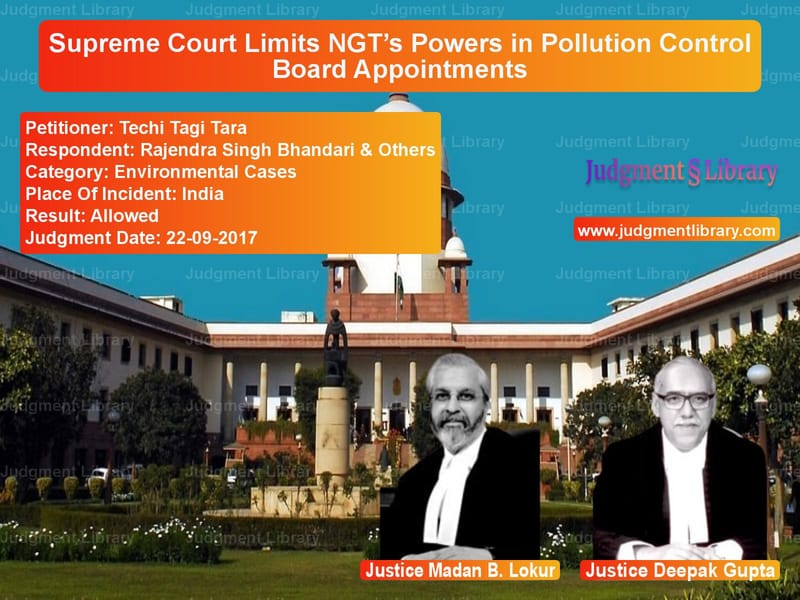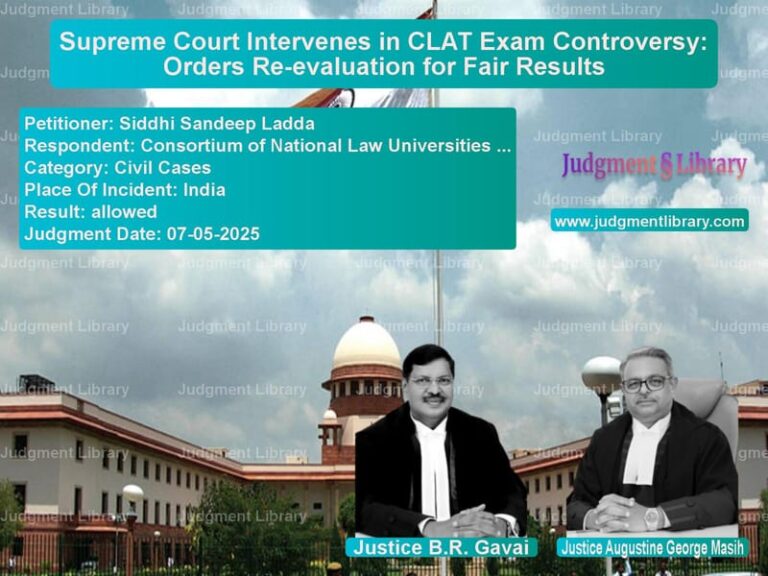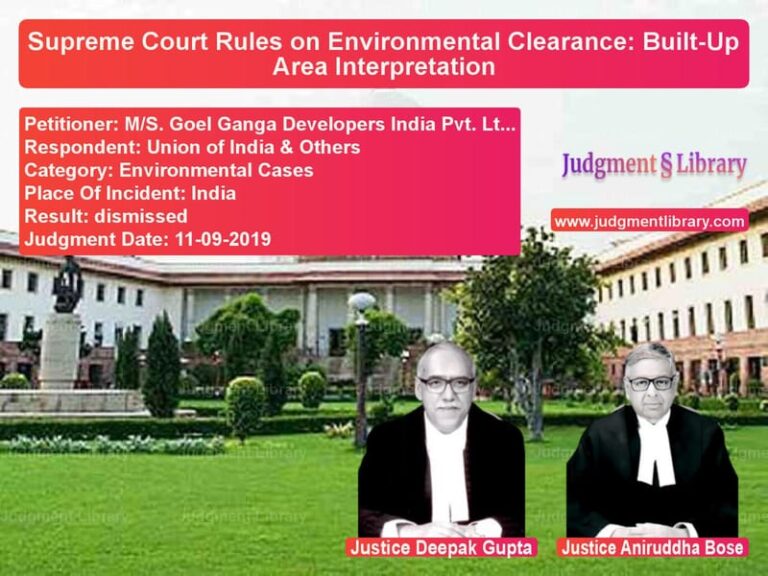Supreme Court Limits NGT’s Powers in Pollution Control Board Appointments
The case of Techi Tagi Tara vs. Rajendra Singh Bhandari & Others is a landmark ruling concerning the jurisdiction of the National Green Tribunal (NGT) in administrative matters related to environmental governance. The Supreme Court was tasked with deciding whether the NGT had the authority to issue directives regarding the appointment process of State Pollution Control Boards (SPCBs), a function traditionally reserved for state governments.
This case raises fundamental questions about the separation of powers and the extent to which tribunals can interfere in executive decisions. The Supreme Court ultimately held that while the NGT plays a crucial role in adjudicating environmental disputes, it cannot dictate governance matters, particularly in relation to appointments to statutory bodies.
Background of the Case
The dispute originated from concerns regarding the qualifications of individuals appointed to SPCBs across various states. Environmental activist Rajendra Singh Bhandari filed a petition before the NGT challenging the appointments, arguing that they violated the provisions of the Water (Prevention and Control of Pollution) Act, 1974 and the Air (Prevention and Control of Pollution) Act, 1981.
In a detailed order dated August 24, 2016, the NGT directed state governments to:
- Review all appointments made to SPCBs.
- Ensure that only qualified professionals with expertise in pollution control were appointed.
- Establish criteria for future appointments based on scientific and technical competence.
Aggrieved by the NGT’s decision, several state governments and affected appointees approached the Supreme Court, arguing that the tribunal had exceeded its jurisdiction.
Legal Issues in the Case
- Does the NGT have the authority to review and direct appointments to statutory bodies like SPCBs?
- Do state governments have absolute discretion in appointments, or must they adhere to specific qualifications?
- Does the NGT’s directive violate the separation of powers under the Constitution?
Arguments of the Petitioner (Techi Tagi Tara & Others)
- The petitioners argued that the NGT had overstepped its jurisdiction by interfering in governance matters, which are the prerogative of the state government.
- They contended that the NGT’s role is limited to adjudicating environmental disputes and ensuring compliance with pollution control laws, not making administrative decisions.
- The appointments in question were made in accordance with existing laws, and the NGT had no power to review or modify them.
- The correct forum for challenging appointments was the High Court under its writ jurisdiction, not the NGT.
Arguments of the Respondents (Rajendra Singh Bhandari & Others)
- The respondents argued that unqualified individuals were being appointed to SPCBs, undermining environmental governance.
- They contended that the NGT had a duty to ensure that environmental regulatory bodies were staffed with competent professionals.
- The Water and Air Acts prescribe qualifications for SPCB members, and appointments that do not adhere to these provisions are invalid.
- The principle of sustainable development requires that only technically sound individuals be entrusted with pollution control responsibilities.
Supreme Court’s Observations
The Supreme Court analyzed the relevant provisions of the Water Act, the Air Act, and the NGT Act. It made the following key observations:
- The NGT is a specialized tribunal created to hear environmental disputes, not to interfere in administrative governance.
- The appointment of SPCB members is a policy matter falling under the jurisdiction of state governments.
- The NGT’s directive lacked statutory backing and encroached upon the executive’s domain.
- While the NGT’s concerns regarding the qualifications of appointees were valid, its order went beyond its legally defined powers.
The Court stated:
“The National Green Tribunal is not empowered to adjudicate upon service matters or appointments made to statutory bodies. Its jurisdiction is confined to resolving disputes relating to environmental protection and pollution control.”
Final Ruling
The Supreme Court set aside the NGT’s order and ruled:
- The appointment of SPCB members is the prerogative of state governments.
- The NGT has no authority to review or modify administrative decisions related to appointments.
- Individuals aggrieved by an appointment must approach the respective High Court under Article 226 of the Constitution.
- State governments are encouraged to ensure that only competent professionals are appointed to SPCBs.
Conclusion
This judgment clarifies the jurisdiction of the NGT and reinforces the principle of separation of powers. While it recognizes the need for competent appointments in environmental bodies, it upholds the executive’s discretion in making such decisions. The ruling also serves as a guideline for ensuring that specialized tribunals do not exceed their legally defined roles.
Don’t miss out on the full details! Download the complete judgment in PDF format below and gain valuable insights instantly!
Download Judgment: Techi Tagi Tara vs Rajendra Singh Bhand Supreme Court of India Judgment Dated 22-09-2017.pdf
Direct Downlaod Judgment: Direct downlaod this Judgment
See all petitions in Environmental Cases
See all petitions in Legislative Powers
See all petitions in Public Interest Litigation
See all petitions in Judgment by Madan B. Lokur
See all petitions in Judgment by Deepak Gupta
See all petitions in allowed
See all petitions in supreme court of India judgments September 2017
See all petitions in 2017 judgments
See all posts in Environmental Cases Category
See all allowed petitions in Environmental Cases Category
See all Dismissed petitions in Environmental Cases Category
See all partially allowed petitions in Environmental Cases Category







